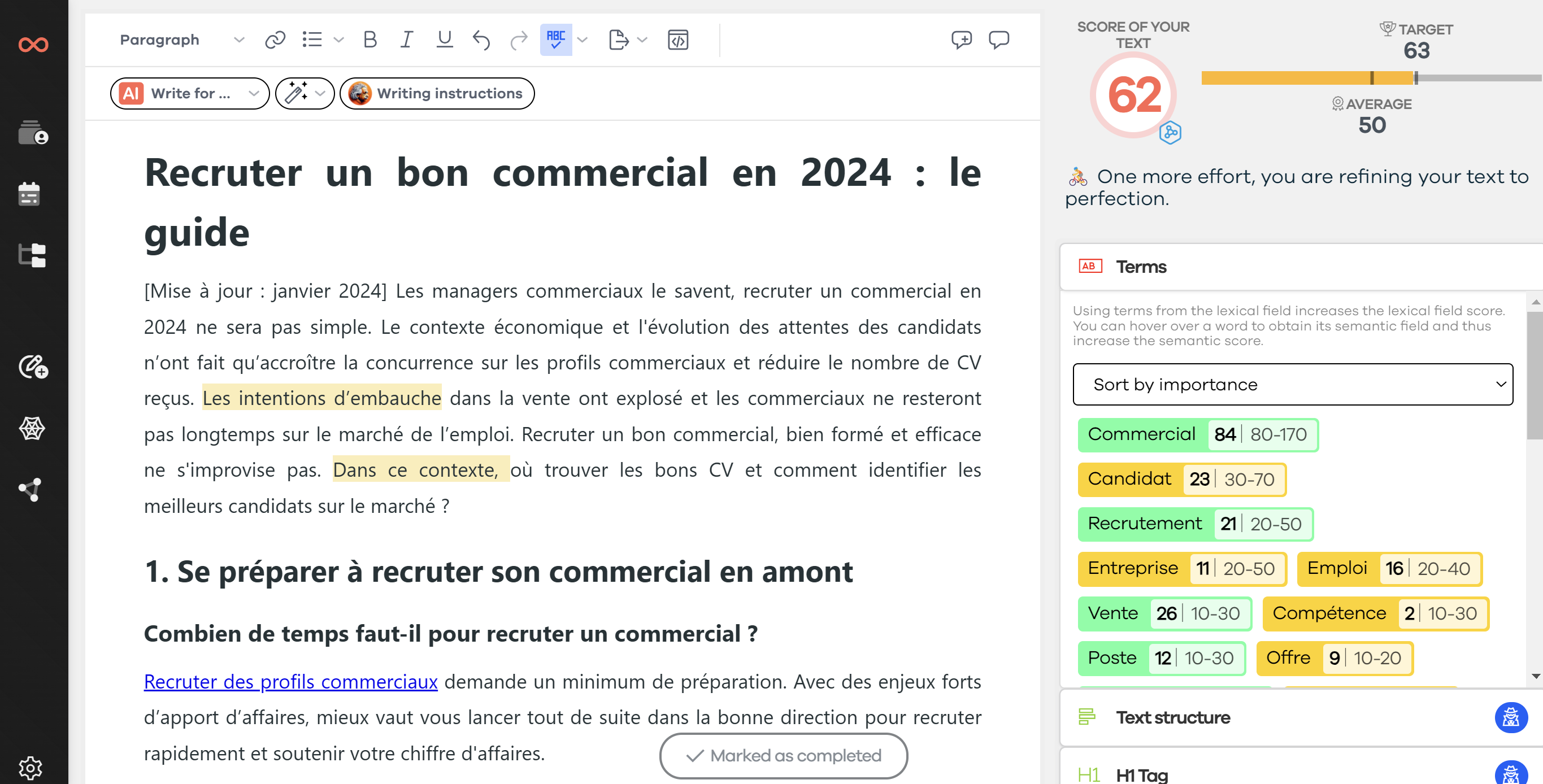Writing is a task that fits perfectly into chaos theory. The slightest modification of the multiple variables in your work environment indeed leads to divergent results in writing productivity. Becoming more productive in writing therefore requires a comprehensive approach.
First, acting on your work environment allows you to create favorable conditions for writing. Having an idea and writing a blog post, a white paper, or social media posts are original activities. Writing does not submit to the usual structuring of professional tasks.
Secondly, learning to use tools to improve your productivity is a necessity. They don't write for you. But they help facilitate the writing process: before, during, and after. Used methodically, they multiply your writing abilities. Used poorly, they devour your time and energy.
Finally, adopt the 7 writing techniques of the best copywriters. Discover how to become more productive in writing with our advice. Develop ideas, write, publish.
🧘♂️ Create favorable conditions to write more efficiently

Writing productivity obeys the laws of brain function and creativity. It is therefore a matter of creating an environment that allows the best possible use of your writing abilities.
Focus and sharpen your attention for better writing
The brain is a high-level athlete. It is not a computer. To win a competition, it needs preparation and a positive environment.
Impose your writing sessions
At the office, there are multiple demands. Emergencies follow emergencies. Writing never seems as pressing as so-called productive activities. The effects of your writing are indeed diluted over time. Writing activities are thus classified as "important but not urgent" in Eisenhower's famous matrix.
Impose your writing sessions to become more productive. Your writing contributes to your inbound marketing strategy and communication policy. Integrate writing activities into your week and day as professional tasks. You now have an appointment with writing. Communicate and share your new habits.
Help your mind focus
To become more productive in writing, our brain must direct its attention to writing. Eliminate distractions and solicitations. For your writing projects, choose a quiet, minimalist, and isolated place. Nothing and no one should disturb you. Without a phone or computer notification, you are ready to write. Use apps like Motion to block sources of distraction on your computer.
Effectively cultivate your writing ideas
Idea searching sometimes requires a lot of energy. Lack of inspiration creates a state of stress contrary to the emergence of ideas. In psychology, this is called a refractory state. The more you want to have an idea, the less capable you are of having one. It's the same mechanism for sleep.
To become more productive in writing, your approach must be intentional. You have a white paper to write. No ideas?
- Let time do its work. Think about your subject in advance of writing. Take notes whenever an idea comes up.
- Get in the habit of developing your attention on your white paper. Create connections with your daily life, current events, and your readings. Your environment nourishes your creativity.
- Walk or do manual activities. The brain rests while maintaining particular attention to your writing project.
- Perlaboration is a slow and silent process that allows the emergence of ideas in psychoanalysis. In writing, the mechanism is similar. You save time by taking your time!
Adopt the right mindset for more writing productivity
Writing should no longer represent a constraint. It should be a deliberate intention and practice. A positive mindset promotes writing work. The brain records this positive feeling when you write. Think about the action of dopamine and well-being hormones. The days when you write then become moments of pleasure. This is essential for becoming more productive in writing.
🛠️ Use the right tools to become more productive in writing

The use of writing assistance tools serves three purposes: collecting information, organizing it, and writing it.
Change your note-taking habits: use tools to increase productivity
Using tools to collect information allows you to create a second brain. You can draw on all your ideas for your writing projects: notes, articles, emails, or books. In this area, Evernote and Notion are the most well-known.
Install an extension for one of these applications. As soon as you spot content that can feed your writing projects, click on the extension. This content is instantly saved in the tool. You can tag it to identify themes.
When you need to write, type a keyword in the search tab. The list of articles on the project is suggested. The productivity gain is real. The articles are already read and qualified. You no longer have to do documentary research.
Organize your writing notes to organize your work plan
To become more productive in writing, you need to be able to quickly organize your notes and information to identify a plan. The mind map or mental map is valuable for organizing ideas. X-Mind and MindMeister offer two online mind map tools. Their use is relatively simple.
- Place each idea on the mental map.
- Group ideas close to the same theme by moving them on the map.
- You get a visual mapping of your ideas. Dominant themes appear. These are the parts of your plan.
- You can deepen the tree structure up to three levels to obtain sub-parts.
To discover the complete method, read Xavier Delengaigne's book: Write quickly and well with mind mapping.
Choose a reading medium that facilitates productive work
Sharing your writing work is often productive. Choose two different reviewers. Identify one person who is more likely to agree with your ideas and one person who is more reserved. The cross-examination will help you better position your writing and explain your idea differently.
To become more productive in writing, use a collaborative writing tool. Google Doc is probably the most widely used collaborative tool. It allows you to easily share your writing. Learning to use it is quick. User management is also simple. You enter the email of your reviewers to give them access to your writing.
They can then write their comments in the margin of your text. Google Doc is installed on computers and phones. Each person can organize themselves according to their habits or availability. Becoming more productive in writing is also a collective adventure!
🚀 Adopt 7 writing techniques to become more productive in writing

To become more productive in writing, test our writing technique tips. Experienced copywriters use them to write quickly and well.
1. Break your writing work into small tasks
If writing a 2000-word article seems insurmountable, break the writing work into several tasks. Isolate writing sessions over several days. The overall task thus seems achievable. Choose moments in tune with your energy. Studying your chronotype can help you identify your ideal sequences in a day: morning, afternoon, or evening.
- The session on the first day can be dedicated to documentary research.
- Then, a second session aims to build a plan.
- A third consists of writing the introduction or lead of your text.
- The sessions on the following days concern the writing of the other parts.
- Keep a session for proofreading on the last day.
2. Take breaks and let your writing rest effectively
Becoming more productive in writing involves a paradox: knowing how to take breaks. To be creative, the brain needs real breaks. A 90-minute work sequence is optimal. Then, take a 10 to 20-minute break. Use it to stretch your legs. Sitting down numbs the body. Finally, resume your writing or schedule a new session.
This new habit creates a break in your work. It's a beneficial distance. When you resume your writing, you have a fresh perspective. You increase your ability to concentrate. Cal Newport calls these privileged moments "deep work": in-depth work linked to a state of absolute concentration.
3. Don't seek perfection in writing, be productive in your work
"Done is better than perfect!" is an expression that helps us overcome our fear of imperfection. You know, that little voice that influences us:
- "You can do better";
- "Something is missing";
- "I'm not enthusiastic when reading my work";
- "You must write the best text on the subject."
Writing is an athlete's work. Writing is a muscle. Stephen King, in his book "On Writing: A Memoir of the Craft", advises writing 2000 words a day. Train your muscle. Experiment with this practice to become more productive in writing. Publish your text even if it's not perfect. And start again!
4. Use a spell checker to become more productive in writing
Spelling issues should not slow down your writing. Use an online spelling correction solution to save time searching and correcting mistakes. Today's tools integrate with your word processing software. MerciApp offers an efficient and easy-to-use extension to correct your mistakes as you write.
Spelling correction tools help you progress. As mistakes are corrected, your brain visually records the corrections made. Not making mistakes seems impossible. But reducing the time spent correcting mistakes is possible!
5. The "So what?" method for efficient writing
To become more productive in writing, you must not get sidetracked during the writing process. Keep your main thread or risk having to redo your text. How to eliminate doubt about the relevance of your writing during its drafting?
Copywriters use the "So what?" method to check if their content is of interest to their readers. They ask themselves this question at the end of each paragraph: the written text must provide added value to the reader and make them want to discover more.
6. Recycle your writing work to write new articles
Your writing work includes two main types of content: long texts intended to describe a theme and short texts (less than 500 words) intended for communication.
- Short publications are mainly for social networks: LinkedIn and Facebook posts.
- Long publications are intended to evangelize an audience: blog articles, newsletters, or white papers.
To become more productive in writing, you can extract content ideas from your long publications for articles or posts. If you have written a white paper on conflict prevention in the workplace, you can identify several themes to exploit in new publications: emotions, breathing, nonviolent communication, and mediation.
7. Choose the title of your articles last to become more productive in writing
Giving a title to a piece of writing seems to be a priority for every writer. However, finding the right title takes a lot of time. Not being able to find the ideal wording hinders your progress. We recommend that you first write only the theme as the title. Then, when your text is finalized, make a list of possible titles.
- Natural referencing (SEO or Search Engine Optimization) if you publish on the Internet.
- Writing rules on LinkedIn: only the first lines of the publication are visible, so the title must be catchy.
To write quickly and well, be patient! Train the writing muscle. Take care of your environment and equip yourself with writing assistance tools.
It's your turn! Try each of the tips given in this article to try to become more productive in writing. Maybe then you will find your own techniques that will allow you to improve your writing speed.
Need to go further?
If you need to delve deeper into the topic, the editorial team recommends the following 5 contents:

